|
|
|
Sort Order |
|
|
|
Items / Page
|
|
|
|
|
|
|
| Srl | Item |
| 1 |
ID:
111690
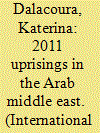

|
|
|
|
|
| Publication |
2012.
|
| Summary/Abstract |
The Arab uprisings of 2011 are still unfolding, but we can already discern patterns of their effects on the Middle East region. This article offers a brief chronology of events, highlighting their inter-connections but also their very diverse origins, trajectories and outcomes. It discusses the economic and political grievances at the root of the uprisings and assesses the degree to which widespread popular mobilization can be attributed to pre-existing political, labour and civil society activism, and social media. It argues that the uprisings' success in overthrowing incumbent regimes depended on the latter's responses and relationships with the army and security services. The rebellions' inclusiveness or lack thereof was also a crucial factor. The article discusses the prospects of democracy in the Arab world following the 2011 events and finds that they are very mixed: while Tunisia, at one end, is on track to achieve positive political reform, Syria, Yemen and Libya are experiencing profound internal division and conflict. In Bahrain the uprising was repressed. In Egypt, which epitomizes many regional trends, change will be limited but, for that reason, possibly more long-lasting. Islamist movements did not lead the uprisings but will benefit from them politically even though, in the long run, political participation may lead to their decline. Finally, the article sketches the varied and ongoing geopolitical implications of the uprisings for Turkish, Iranian and Israeli interests and policies. It assesses Barack Obama's response to the 2011 events and suggests that, despite their profound significance for the politics of the region, they may not alter the main contours of US foreign policy in the Middle East in a major way.
|
|
|
|
|
|
|
|
|
|
|
|
|
|
|
|
| 2 |
ID:
154477
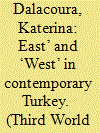

|
|
|
|
|
| Summary/Abstract |
The tired old civilisational categories of ‘East’ and ‘West’, loosely identified with ‘Islam’ and ‘modernity’, are alive and well, nowhere more so than in contemporary Turkey. The Justice Development Party (AKP) currently in government employs them assiduously to political advantage but they have a long history, having defined the parameters of societal identity and political discourse throughout the history of the Turkish Republic. The paper takes the strength of the categories as its starting point but moves beyond them by asking if discourses, narratives and identities, individual and collective, exist in Turkey which question, overcome and ultimately undermine the categories of ‘East’ and ‘West’. The paper starts by investigating the evolution of ideas about East and West since the late Ottoman period and accepts that they are still dominant. However, since the 1980s in particular, they are being undermined in a de facto way by cultural developments in literature and music, new trends in historiography and novel ways of relating to the past. In some ways in contemporary Turkey, the paper concludes, culture trumps the inherently essentialist idea of ‘civilisation’ and Turkish society is ahead of its political and intellectual elites.
|
|
|
|
|
|
|
|
|
|
|
|
|
|
|
|
| 3 |
ID:
134646
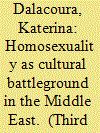

|
|
|
|
|
| Summary/Abstract |
The culture wars over homosexuality in the Middle East are studied here in the context of the theoretical debate on culture in International Relations and, more specifically, through a critical examination of postcolonial international theory. The paper argues that, although postcolonialism can offer a useful framework, it also has, in its poststructuralist variants, significant limitations in addressing the controversial issues surrounding homosexuality as cultural battleground in the Middle East. These limitations derive from an unconvincing interpretation of the relationship between the Middle East and modernity; and a problematic approach towards moral agency. The paper serves a dual purpose. Through the use of the empirical material, it furthers the debate within postcolonial international theory by bringing evidence to bear in support of its humanist or materialist strands. The theoretical discussion, in turn, by highlighting the intertwining of culture and power in the debates on homosexuality, strengthens the case for respecting homosexual rights in the Middle East region.
|
|
|
|
|
|
|
|
|
|
|
|
|
|
|
|
| 4 |
ID:
049901
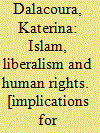

|
|
|
|
|
| Publication |
London, I.B. Tauris, 1998.
|
| Description |
viii, 238p.
|
| Standard Number |
1860648665
|
|
|
|
|
|
|
|
|
|
|
|
Copies: C:1/I:0,R:0,Q:0
Circulation
| Accession# | Call# | Current Location | Status | Policy | Location |
| 047357 | 297.272/DAL 047357 | Main | On Shelf | General | |
|
|
|
|
| 5 |
ID:
179815
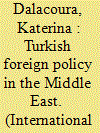

|
|
|
|
|
| Summary/Abstract |
Power projection, security, pragmatic considerations and a disparate mix of national interests and narrower party-political objectives have driven the foreign policy of Turkey's Justice and Development Party (AKP) in the Middle East since it came to power in 2002. Ideological concerns, consisting of a fluid blend of Islamist, neo-Ottoman and ‘civilizationalist’ ideas, mingled with a hefty dose of Turkish nationalism, have played a variable, auxiliary but none the less significant role. The Arab uprisings of 2011 opened up opportunities for the AKP to pursue its ideological objectives and they became more central to its policies, if only in some areas or clusters of relationships. However, they receded after 2015, when a confluence of domestic and regional factors caused the onset of a transactional, ‘post-ideological’ phase. The article places the Middle East in the wider context of Turkish foreign policy, both historically and in comparison with other regions, arguing in the process that categories of ‘East’ and ‘West’ are of limited value for its proper understanding and interpretation. It then divides it into four sub-regions, distinct in geographical and issue terms: Syria and Iraq (the ‘near abroad’), the wider Arab world, Israel–Palestine, and Iran. It analyses Turkish foreign policy towards them in sequence, illustrating the ways in which power-political considerations have predominated in all, albeit in different ways and to varying degrees, over the past five years.
|
|
|
|
|
|
|
|
|
|
|
|
|
|
|
|
| 6 |
ID:
066020
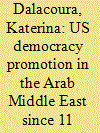

|
|
|
|
|
|
|
|